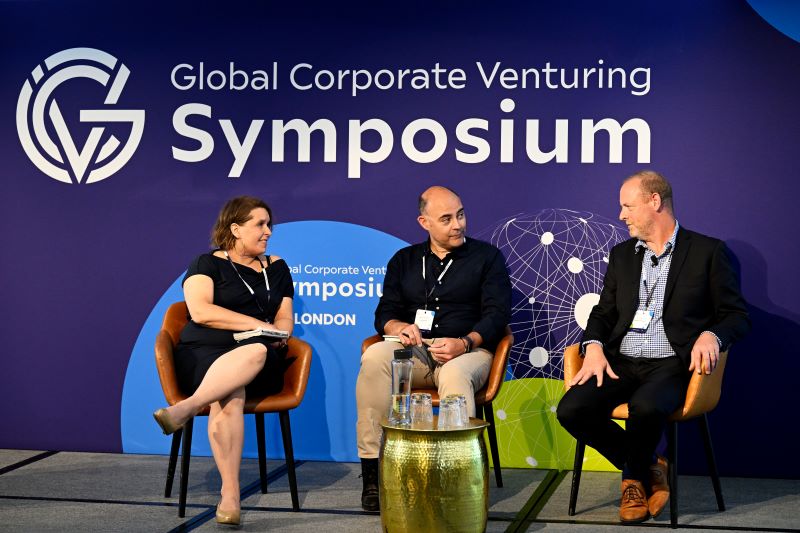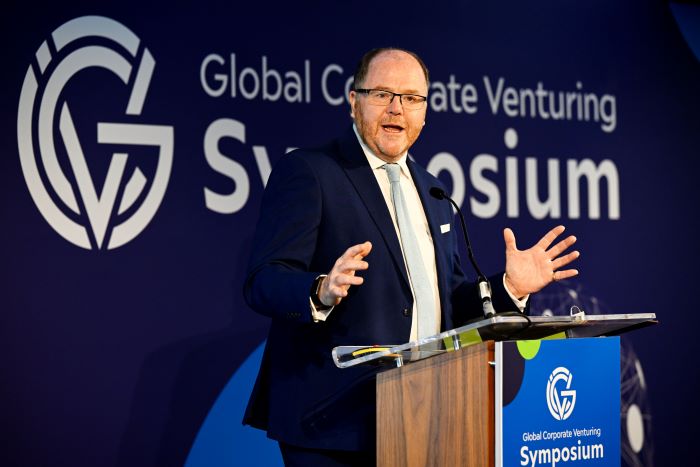
The who’s who of corporate venturing descended on London last week for the annual Global Corporate Venturing Symposium. The conference took place at a time of economic uncertainty for investors, with a possible prolonged downtun on the cards.
But recent GCV data suggest that the decline in corporate-backed start-up funding deals has levelled off in 2023. Indeed, 70% of corporates that invested in a startup in 2022 returned to do another deal this year.
Anecdotally, corporate investors were optimistic that the sector may not be in for as rough a ride as some had feared. While the investment pace may be down from the go-go days of 2020 and 2021, many investors told the Symposium audience they were doubling down on strengthening the connection between the between the startups they had invested in and the parent corporation, in order to help drive revenue growth at startups.
The professionalism of the CVC sector seems only to have grown.
GCV editorial staff put together this round-up of things we learned from the conference, from the growing emphasis on embedding business development in CVC teams to the EU’s keenness to bring US corporate investment to the European startup sector.
Kim Moore, deputy editor, Global Corporate Venturing
1. The business development role at CVCs is a hot-ticket item
The idea of embedding a business development team in corporate investment funds has gained traction over the past few years, but it seems most CVC units now have at least one member of the team who connects portfolio companies with business units in the parent to help the startups grow. Several panel discussions focused on how CVCs are using business development to make stronger connections with the mothership.
In a downturn, this is a savvy survival tactic. The parent company is more likely to shut CVC units down if they don’t see value from them. If business development is embedded in the CVC, it gives the CVC fund more positive exposure. “In these economic times, you really need the support of the mothership,” said attendee Gen Tsuchikawa, CEO and chief investment officer of Sony Ventures Fund.
There are fewer deals around in this high interest rate environment, making competition fierce for good startups that are seeking financing. Several attendees pointed out that having a clear strategy for connecting startups with the parent’s business units makes their funds stand out to startups seeking corporate investment.
Clayton Williams, managing director of In-Q-Tel, a fund that invests on behalf of the US, UK and Australian governments, talked on the sidelines of the conference about the importance of helping portfolio companies generate revenue in today’s economic environment.
2. AI investing is complicated. Some are taking a wait-and-see approach
There seems to be an AI-focused fund set up every week now as investors seek to take advantage of advances in the technology. But on the sidelines of the conference, corporate investors shared how complicated it can be to invest in the sector. One issue is how quickly the technology is developing. Investors are afraid that startups they put money into today will be outdated in a few months as new AI breakthroughs happen.
It is also not clear to investors how the regulatory landscape will evolve. Regulation of the technology is coming, but until it is clear what the oversight will look like, some are taking a wait-and-see approach.
Investors are also waiting to see how the technology will be applied to specific sectors. ChatGPT, the advanced language generation model developed by OpenAI, has broad applications, but the investment community wants to see more sector-specific uses.
3. The EU wants to increase co-investments with corporates
The European Innovation Council (EIC), Europe’s flagship innovation fund, wants to partner with more corporates – and they don’t have to be from the EU – to support startups working on breakthrough technologies like quantum computing and spacetech.
Stephane Ouaki, head of department at the European Innovation Council, told delegates “there are opportunities for large corporates to collaborate”. The council has a €4bn venture capital fund that just got a €2.6bn increase. Over three years, it has invested in 138 companies.
Europe lags behind the US in the amount of money committed to research and development. The council is actively seeking partnerships in US venture capital, said Ouaki. He said he is seeing growing interest from US corporate investors to back European deals that tend to have lower valuations than in the US.
Oauki spoke on the sidelines of the GCV Symposium about the council’s interest in partnering with corporates:
4. The UK government has £52bn to spend on R&D and its fusion plans are big
George Freeman, the UK minister of state for science, research and innovation, laid out the UK’s government’s plan to “create some really tangible opportunities for deep, long corporate venture investing in our ecosystem,” during his speech to delegates.
The government has budgeted £52bn ($66bn) to spend on research and development over three years. Life science will get a £9bn chunk. Other sectors it is targeting are spacetech, agritech, cleantech, automotive, materials and robotics.
Five strategic technologies that the government sees as critical to geopolitical and economic security are AI, telecoms, semiconductors, quantum computing and engineering biology.
Freeman touted the UK’s commitment to developing fusion technology. In February it created a company, UK Industrial Fusion Solutions Ltd, to work on a prototype fusion energy plant in Nottinghamshire. Plans include building the world’s first spherical tokamak. “We’re going to crowd in investors in the fusion economy,” said Freeman. “And we’re going to structure that so international investors, corporate investors in the energy sector and elsewhere can come on board with us.”

Fernando Moncado Rivera, reporter, Global Corporate Venturing
5. This downturn is not as bad as past ones
Despite the market cooling, this downturn is not like past dips in the venture market, according to Jeff Baglio, managing partner and the co-chair of the corporate venture practice at law firm DLA Piper. The deal volume is down, but more deals are getting done than in previous cooling periods.
Corporate investors are also participating in more deals than in past downturns. They are leading more of the insider-driven friendly flat rounds designed to keep portfolio companies afloat, with fewer “penalty terms” – like full ratchet anti-dilution protections and extortionate liquidation preferences – than in past dips. They are, however, now more willing to walk away from portfolio companies than they have been in the past because of a higher reputational risk for corporate investors.
Rob Lavine, features editor, Global Corporate Venturing
6. There’s a shadow VC space and the corporates are part of it
One of the more interesting talks saw MSD GHI’s Bill Taranto explaining why there’s no shame in raising a down round. But while startups may need to hear that, it felt like the investors were already onboard. Several CVC investors told GCV that had been part of several down rounds in recent months that weren’t publicised.
Most of the time these rounds involved existing portfolio companies quietly raising cash at a down valuation as they looked to extend their runway. In other words, when a CVC unit talks about supporting their portfolio, it isn’t just with advice. And when they mention finding value in a downturn, they don’t just mean new investments.
Angela Logan, content editor, Global Corporate Venturing
7. It is a good time for CVCs to take a breather and do due diligence
Despite the downturn, it is a good time for CVCs to invest, said Joerg Landsch, head of central corporate venture capital at Deutsche Bank, and Gurdeep Singh Koli, founding member of SC Ventures. Because the pace startup funding deals has slowed down from 2020 and 2021 there is much more time for CVC units to carry out their due diligence. They should also take a step back and see how their portfolio companies can work together and potentially even merge.
As the post pandemic economic dip deepens, Landsch said investors should be most concerned about interest rates – where, when and how these would balance out. The important question for now is no longer whether a business is going to be profitable but “is this business model sustainable?”.
It’s also a time to be much more careful around valuations. “It’s not like a few years ago when valuations weren’t so important and everything was always going up”, Landsch said. Deutsche Bank always invests alongside a VC, to avoid getting carried away or investing “stupid money”. If you invest too much money now, you could be facing a down round soon enough when the next raise comes along. “Be strict and cautious about what you pay right now. Get the right price,” Landsch advised.
